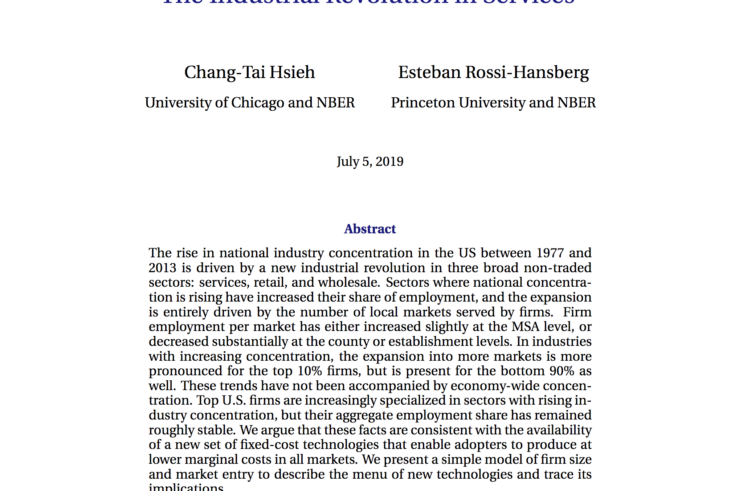Showing results for: “sirius xm merger”
What if rising concentration were an indication of more competition, not less?
An oft-repeated claim of conferences, media, and left-wing think tanks is that lax antitrust enforcement has led to a substantial increase in concentration in the US economy of late, strangling the economy, harming workers, and saddling consumers with greater markups in the process. But what if rising concentration (and the current level of antitrust enforcement) ... What if rising concentration were an indication of more competition, not less?
Private Antitrust: What Hipsters Can Learn from Hulk Hogan
Antitrust populists have a long list of complaints about competition policy, including: laws aren’t broad enough or tough enough, enforcers are lax, and judges tend to favor defendants over plaintiffs or government agencies. The populist push got a bump with the New York Times coverage of Lina Khan’s “Amazon’s Antitrust Paradox” in which she advocated ... Private Antitrust: What Hipsters Can Learn from Hulk Hogan
Economics is Dead. Long Live Economics! A Review of The Economists’ Hour
John Maynard Keynes wrote in his famous General Theory that “[t]he ideas of economists and political philosophers, both when they are right and when they are wrong, are more powerful than is commonly understood. Indeed the world is ruled by little else. Practical men who believe themselves to be quite exempt from any intellectual influence, ... Economics is Dead. Long Live Economics! A Review of The Economists’ Hour
On the Antitrust Risks of Four to Three Mergers: A Case Study of a Potential ThyssenKrupp/Kone Merger
Today, Reuters reports that Germany-based ThyssenKrupp has received bids from three bidding groups for a majority stake in the firm’s elevator business. Finland’s Kone teamed with private equity firm CVC to bid on the company. Private equity firms Blackstone and Carlyle joined with the Canada Pension Plan Investment Board to submit a bid. A third ... On the Antitrust Risks of Four to Three Mergers: A Case Study of a Potential ThyssenKrupp/Kone Merger
The Forgotten Virtues of Doing Nothing
This guest post is by Jonathan M. Barnett, Torrey H. Webb Professor Law, University of Southern California Gould School of Law. It has become virtual received wisdom that antitrust law has been subdued by economic analysis into a state of chronic underenforcement. Following this line of thinking, many commentators applauded the Antitrust Division’s unsuccessful campaign ... The Forgotten Virtues of Doing Nothing
Rising Concentration, Rising Prices: Not So Fast
Wall Street Journal commentator, Greg Ip, reviews Thomas Philippon’s forthcoming book, The Great Reversal: How America Gave Up On Free Markets. Ip describes a “growing mountain” of research on industry concentration in the U.S. and reports that Philippon concludes competition has declined over time, harming U.S. consumers. In one example, Philippon points to air travel. ... Rising Concentration, Rising Prices: Not So Fast
Vertical Mergers: Fast Food, Folklore, and Fake News
In the Federal Trade Commission’s recent hearings on competition policy in the 21st century, Georgetown professor Steven Salop urged greater scrutiny of vertical mergers. He argued that regulators should be skeptical of the claim that vertical integration tends to produce efficiencies that can enhance consumer welfare. In his presentation to the FTC, Professor Salop provided ... Vertical Mergers: Fast Food, Folklore, and Fake News
The Digital Policy of the Next EU Commission: All roads Lead to Margrethe Vestager
Ursula von der Leyen has just announced the composition of the next European Commission. For tech firms, the headline is that Margrethe Vestager will not only retain her job as the head of DG Competition, she will also oversee the EU’s entire digital markets policy in her new role as Vice-President in charge of digital ... The Digital Policy of the Next EU Commission: All roads Lead to Margrethe Vestager
T-Mobile Sprints to the Finish Line: States Demand a Do-Over
The Department of Justice announced it has approved the $26 billion T-Mobile/Sprint merger. Once completed, the deal will create a mobile carrier with around 136 million customers in the U.S., putting it just behind Verizon (158 million) and AT&T (156 million). While all the relevant federal government agencies have now approved the merger, it still ... T-Mobile Sprints to the Finish Line: States Demand a Do-Over
Merger Lore: Dispelling the Myth of the Maverick
There’s always a reason to block a merger: If a firm is too big, it will be because it is “a merger for monopoly”; If the firms aren’t that big, it will be for “coordinated effects”; If a firm is small, then it will be because it will “eliminate a maverick”. It’s a version of ... Merger Lore: Dispelling the Myth of the Maverick
Breaking up Facebook Would Be a Technical and Organizational Nightmare — and Would Almost Certainly Harm Consumers
[This post is the fifth in an ongoing symposium on “Should We Break Up Big Tech?” that features analysis and opinion from various perspectives.] [This post is authored by William Rinehart, Director of Technology and Innovation Policy at American Action Forum.] Back in May, the New York Times published an op-ed by Chris Hughes, one ... Breaking up Facebook Would Be a Technical and Organizational Nightmare — and Would Almost Certainly Harm Consumers
Separation without a Breakup
[This post is the fourth in an ongoing symposium on “Should We Break Up Big Tech?“that features analysis and opinion from various perspectives.] [This post is authored by Pallavi Guniganti, editor of Global Competition Review.] Start with the assumption that there is a problem The European Commission and Austria’s Federal Competition Authority are investigating Amazon ... Separation without a Breakup







